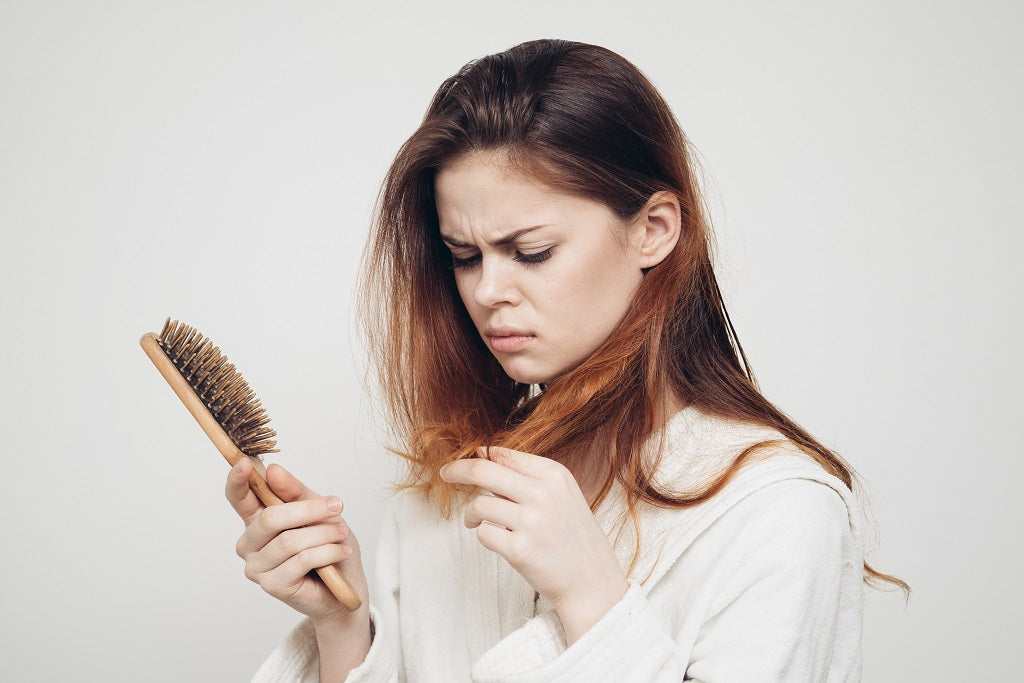There has been a growing controversy over diet, especially regarding weight loss, skin, and hair. Experts adhere to the idea that there isn't a single rule that applies to everyone, and that's where gluten food comes into play.
Most of us eat food items like bread and chapati regularly that are gluten-based, making digestion difficult and damaging our health. Because of the health risks associated with gluten, people are opting for gluten-free food.
A variety of brands offer gluten-free products; many are concerned about how this ingredient affects our health, particularly regarding hair and skin. Experts have warned that those with metabolic disorders might have trouble digesting gluten, which could trigger health problems such as loss of hair, joint pain, and digestive problems. This blog will explain how gluten can affect your hair health and how to go gluten-free.
What Is Gluten?

Gluten is a protein mostly found in grains, such as wheat, barley and rye. True to its name, gluten holds the whole product like glue. The elasticity of dough is attributed to it. The foods we frequently consume, including, chapati, roti, pasta, pizza, bread, and donuts, contain gluten. Gluten provides no essential nutrients. Some people are intolerant of gluten, so much so that their immune system attacks their own tissues each time they eat gluten.
Gluten Intolerance and Hair Loss: What Is The Link?
The causes of hair loss are numerous, including genetics, age, hormonal issues, heat, pollution, and chemical treatments. One of the main causes of loss of hair is poor digestion due to gluten intolerance as well as the deficiencies in nutrient intake that result from it. Although gluten intolerance is seen in many people, it's often not diagnosed. The condition can be mild or severe and is difficult to detect in mild cases. Let's discuss different types of hair loss due to gluten intolerance.
Also Read : Reasons For Hair Loss
1. Celiac Disease
Celiac disease occurs when the lining of the small intestine is damaged, causing inflammation. Due to an inability to absorb essential nutrients, the condition contributes to hair loss.
2. Alopecia Areata
In a recent study, gluten intolerance has been linked to alopecia areata in people. This condition arises when the body's auto-immune response attacks its hair follicles, leading to the loss of hair in patches.
As per experts, switching to a gluten-free diet can help improve your hair health and ensure your general well-being.
What Is a Gluten-Free Diet?
Now that you know all about gluten and its effect on your health, let's see what a gluten-free diet would look like. A gluten-free diet is devoid of food items comprising wheat, rye, or barley. This means avoiding a range of foods commonly consumed, including a variety of processed and packaged foods containing gluten. The most common food items containing gluten include:
- Bread: White bread, whole wheat bread, pizza, burger, sourdough bread, tortillas.
- Chapati: Roti, parathas, naan roti, and kulcha.
- Snacks: Cakes, pastries, biscuits, doughnuts, pancakes, and noodles.
- Sauces: ketchup, soy sauce, beverages like ales, and beer.
- Packed Foods: Oats, granola, energy bars, cereals, muesli.
Now let's have a look at some of the gluten-free options available:
- All kinds of fresh fruits, vegetables, nuts and seeds.
- Whole grains and their flour rice, bajra, jowar, nachni or ragi, arrowroot, makai atta, samo atta, and gluten-free oats.
Also Read : Best Foods For Strong And Healthy Hair (Infographic)
How To Go Gluten-Free: Top 5 Tips To Get Started

Transitioning to a gluten-free diet should be easier once you understand the basic guidelines. Anyone can now change to a gluten-free diet to put an end to hair loss. The trick is to pay more focus to the food you consume. Starting on the gluten-free route might be daunting initially. Here’re a few tips to make the transition to a gluten-free diet hassle-free.
1. Look For The Term 'Gluten-Free' On The Label Of Your Food Product
When you purchase any food item, look at food product labels and check the list of ingredients to steer clear of gluten when beginning a gluten-free diet.
2. Understanding Nutrition Labels
Consuming all-natural food makes it simpler to go gluten-free. But sometimes you may need to buy packed or processed food. There is no harm in that, but you should be able to understand the nutrition labels to avoid any accidental consumption of gluten.
3. Plan Ahead
Plan or explore the menu before you attend a lunch or dinner with friends to avoid gluten-containing food.
4. Diverse Diet
Keeping your diet diverse to satisfy your taste buds prevents gluten-free food from becoming repetitive and boring.
Benefits Of Going Gluten-Free
Check out some of the benefits of going gluten-free!
- Keep a check on weight gain.
- Controls the blood sugar level.
- Reduces hair loss.
- Improves heart health.
- Provides relief from digestive problems such as gas, flatulence, constipation, bloating, or diarrhea.
As per experts, your hair health and overall wellbeing can be improved by switching to a gluten-free diet. Gluten can have a detrimental effect on your health and hair. As per experts, you can deal with inflammation and control hair loss with the right approach.
Disclaimer: All the content on anveya.com/blogs is solely for information. It is not intended to be a substitute for professional medical advice, diagnosis or treatment. Always seek the advice of your physician or a qualified health care provider. The information, suggestion or remedies mentioned on this site are provided without warranty of any kind, whether express or implied.



